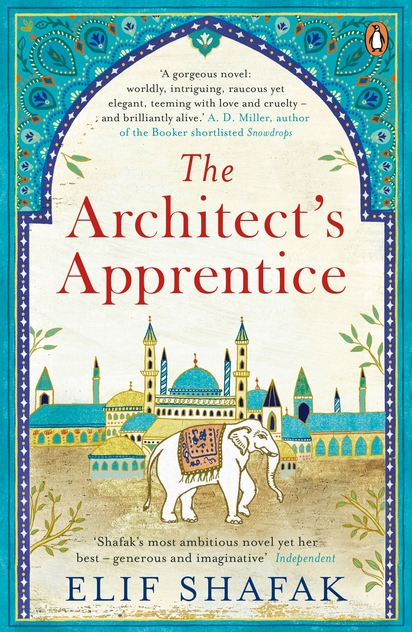
Note to readers: I apologise for the absence of blogging. I was away on a vacation with my husband for his birthday from Thursday and we only got home yesterday. Now that I’m back, the blogging will return to normal.
It didn’t take me long to finish reading this, probably because it got me hooked from the start. There are books that make me read because they are there and because I love to read. And then there are books that make me read because they are so full of suspense and I always want and need to know what’s going to happen next.
‘The Architect’s Apprentice’ by Elif Shafak was just that kind of book. From the moment I flipped the first page to completing the first chapter, I knew that this book would be keeping me up on Sunday nights even though I have work the next day. This book would be tempting me on Friday nights, knowing full well that the weekend is here and all it needs is the unwavering attention from this reader.
Synopsis from Goodreads:
From the acclaimed author of The Bastard of Istanbul, a colorful, magical tale set during the height of the Ottoman Empire
In her latest novel, Turkey’s preeminent female writer spins an epic tale spanning nearly a century in the life of the Ottoman Empire. In 1540, twelve-year-old Jahan arrives in Istanbul. As an animal tamer in the sultan’s menagerie, he looks after the exceptionally smart elephant Chota and befriends (and falls for) the sultan’s beautiful daughter, Princess Mihrimah. A palace education leads Jahan to Mimar Sinan, the empire’s chief architect, who takes Jahan under his wing as they construct (with Chota’s help) some of the most magnificent buildings in history. Yet even as they build Sinan’s triumphant masterpieces—the incredible Suleymaniye and Selimiye mosques—dangerous undercurrents begin to emerge, with jealousy erupting among
Sinan’s four apprentices.A memorable story of artistic freedom, creativity, and the clash between science and fundamentalism, Shafak’s intricate novel brims with vibrant characters, intriguing adventure, and the lavish backdrop of the Ottoman court, where love and loyalty are no match for raw power.
Jahan embarked on a journey on a ship with his only friend, an albino baby elephant, accompanied by rough sailors and their captain across the equally rough seas to Istanbul. Jahan was young when he reached the shores of Istanbul with nothing but the shirt on his back, no known acquaintances, family members or relatives, and food nor money. All he had was the white baby elephant. He was initially meant to be a thief for Captain Gareth who was also onboard the ship which brought him to Istanbul. Faking his identity as the elephant mahout, no one suspected him of anything. However, things began to change along the way for Jahan. Sinan, a Chief Royal Architect to Sultan Suleiman of Istanbul took him under his wing and guided him to becoming a better person. He took on the mantle to teach the little impostor the ways of an architect while playing along to his claim as the Sultan’s mahout.
Each time I finished a chapter, I realised I could no longer view Jahan as he grew up alongside the other apprentices. Jahan forever remained as the little boy from Hindustan to me. Even though he was as old as his master when the latter died by the end of the book. As for his unrequited love affair with the Sultan’s daughter, Princess Mihrimah, he could only watch and admire her from afar, much to the chagrin and the disgust of Hesna Khatun, the Princess’s nursemaid.
Jahan remained the only one alive by the time I finished the last chapter. His apprentice friends had long gone. Nikola died from the plague. Yusuf was discovered to be a woman in disguise and sent away for her own and her master’s safety. Davud became the master’s successor after pulling a few strings and using blackmail. The Chief Royal Architect, the apprentice master himself, had passed away due to old age. His love interest, Princess Mihrimah, although having been betrothed to another man and was no longer available, had herself died of old age. And Jahan’s one and only best friend, the white elephant whom he affectionately named Chota, also died of old age. Of everyone, he was the last living and breathing member.
This got me thinking, “How would I feel if I was the last person alive?” After having known everyone and working with them, loving them and hating them, had gone to another world. Now you are left to wander, lost and alone, as you live out the remaining years of your life. Is this a curse? Or a blessing?
After having served three Sultans and lived through the cutthroat politics of the Ottoman Empire of Istanbul, Jahan did wonder, as he lived out his final years with a woman whom he married who has more than half his age, “What if human beings could only live more like animals, without a thought to the past or the future, and without rounds of lies and deceit, that the world would be a more peaceful place, and perhaps a happier one too?” I couldn’t wonder and agree more myself.